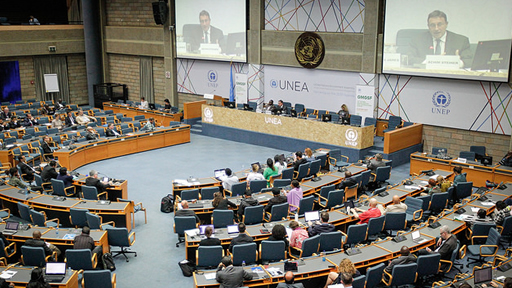(Photo Credit: UNEP)
The United Nations Environment Assembly (UNEA), which represents the world’s highest-level decision-making body on the environment, took place for a second time, under the overarching theme of “Delivering on the environmental dimension of the 2030 Agenda for Sustainable Development”. The Assembly culminated in several resolutions and a global call to action to address the critical environmental challenges, facing the world today.
Dr. Unnikrishnan Payyappallimana, Research Coordinator at the United Nations University, Institute for the Advanced Study of Sustainability (UNU-IAS) joined UNEA-2, in Nairobi on 22 May 2016, to commemorate the International Day for Biodiversity.
In his statement on “Strengthening and Aligning Linkages between Policy and Practice in Health and Biodiversity” he described the close link between health and biodiversity in its multiple dimensions. “Addressing these dimensions in all its complexities is essential to achieving health, wellbeing and equity,” he explained.
There is growing evidence that initiatives focussing on health equity and inclusivity in marginalised groups have moved beyond pilot phases. These projects promote access to resources and healthcare as well as the rights to knowledge and traditional health practices. Further research, capacity building, science-policy interfacing, advocacy, and upscaling of these projects is however needed.
In his presentation Payyappallimana highlighted several impactful initiatives that enabled the co-achievement of health, biodiversity and the sustainable development goals (SDGs) to be potentially replicated elsewhere. These initiatives highlighted multistakeholder partnerships and new forms of international cooperation and financing. ¨Successes come when bottom up initiatives are first acknowledged and mainstreamed. It is time to invest and foster multistakeholder partnerships, innovative forms of international cooperation such as South-South, North-South and triangular co-operations, for mutual learning.¨ His talk described four key areas namely agriculture, medicine, pharmaceuticals and health education.
In agriculture one example Payyappallimana mentioned was the Biodiversity for Nutrition (BfN) initiative. This multi-country project, has lead to policy developments to promote agro-diverse farming and diets, especially for children and women. Similar initiatives have been done by education networks such as ProSPER.Net and the network of Regional Centres of Expertise (RCEs) of UNU.
The WHO states that around 70 % of the world’s population continues to use traditional medicine, with approximately 70,000 species of medicinal plants being used in both traditional and modern medicine. ¨While the likely impacts of climate change on such plants is high, there is no comprehensive data on this, highlighting the importance of more integrated approaches to assess biodiversity and ensure conservation.¨ The Biodiversity and Community Health (BaCH) Initiative by UNU, brings together several multistakeholder agencies with an interest in community health to leverage on and synergize their efforts.
Natural product discoveries still account for a significant part of biopharma R&D with key implications for the discourse on the fair and equitable sharing of resources, including under the CBD’s Nagoya Protocol. The development of local documentation of knowledge linked to Peoples’ biodiversity registers and to intangible property rights are happening in the sphere of international and national legal systems.
In the context of health as well as sustainable development education the global RCE Network (a network of 146 local networks) shows the power of decentralized multistakeholder planning and action. Dr.Nguga Gordon shared an impactful case study from RCE Kakamega, Western Kenya where medicinal plant related enterprise is contributing to supporting not only health needs of the local population but also rural livelihoods.
In his final comments, Payyappallimana referred to the One Health concept, a truly integrated approach to achieving good health for all. The Natural Livestock Farming (NLF) network uses a multi-country partnership in the field of ethno-veterinary care to reduce antibiotic use and resistance. He argued for more action to achieve the broader mandate of good health care at low cost. This requires to connect different sectors and strategically use available resources – natural, human and financial. In this context, facilitating inter-agency cooperation is essential. As the management of natural resources typically falls outside the traditional role of health ministries and departments, it is important that the conservation community takes an active role in pursuing this agenda.
For Unnikrishnan Payyappallimana’s full statement click here.

